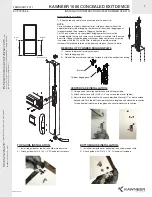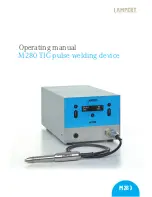
KPA_SERIES.DOC
25/36
INSTALLATION
This speaker-system must only be installed at a solid, plane, anti-slip, vibration-free, oscilation-free and fire-
resistant location.
Before installing the system, make sure that the installation area can hold a minimum point load of 5 times
the system's load (e.g. weight 20 kg - point load 100 kg).
The speaker-system must never be installed higher than 100 cm without secondary attachment.
Install the desired number of speaker-systems in the room.
Every speaker-system features two transportation handles. The speaker-system should be carried without
force by two persons of the same size. Carrying the speaker-system as one person alone should be avoided
as the high weight and the strain could lead to back damages and torsions. Please note that all speaker-
systems with more than 25 kg weight must be transported with two persons.
Installing and orienting the speaker-system
When installing the speaker-system on e.g. a stage, microphones and turntables should always be located
behind the speaker-systems. In this way, you can avoid dangerous and unpleasant feedbacks. If you cannot
install the speaker-systems this way, the microphones and turntables should be located as far away as
possible from the speaker-systems. When using the speaker-system as monitor-system make sure to avoid
feedbacks.
The speaker-systems of a PA-system are normally located left and right to the stage. Do not install the
speaker-systems on the stage, but rather on appropriate tables or platforms in front of the stage.
In order to produce a clear sound, the speaker-systems should be installed in a way that they throw the
sound over the audience's heads. A Full Range speaker-system should be installed at listeners' eye level.
Please refer to the safety instructions under Installation.
Loudspeaker combinations need to be installed bass-middle-high (from bottom to top). Make sure that the
membranes of all speakers are in one line vertically and horizontally. Only in this way all frequency ranges
are produced at the same time and without any time or phase delays.
Always install the speaker-systems in a way that a minimum distance of three meters to the audience is kept.
This is the only way to avoid hearing damage for unreasonable listeners. Block the area in front of the
speaker-systems with appropriate means.
Avoiding feedbacks
One of the most frequent problems when operating speaker-systems are feedbacks. They can be
recognized by howling and growling loudspeakers. Feedbacks are created then a signal is recorded by a
microphone, amplified, played back by a loudspeaker and then again recorded by the microphone.
The prerequisite for feedback is that the played back signal is louder than the original signal. A feedback
never cover the whole frequency range but only one overboosted frequency.
Make sure that you install especially the monitor-speakers so far away from the microphone that another
recording of the microphone signal is impossible.
Extreme levels like feedbacks, bass-hum or the beats of a dropping microphone can destroy the
loudspeakers within very short time and produce immediate hearing damage. Such extreme levels must be
avoided at any rate. We recommend to use appropriate equalizers and Compressor/limiters.
Installing the speaker-cables
Connect the speaker-systems among each other using the inputs and outputs. Connect the cable of the first
speaker-system with the Speaker-socket Output CH-1 and Output CH-2 of the amplifier. The signal will be
transmitted to the individual speaker-systems.
Always treat the cables carefully and protect them from damages during transportation.
Install the cables always in a structured way and protect them from damage.
The cables must be installed in a way that no person can stumble over them. Always fix the cables with an
appropriate tape.












































